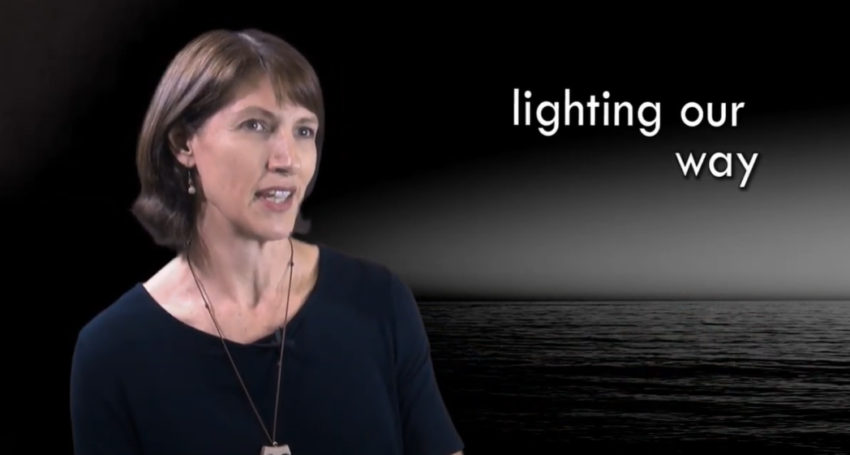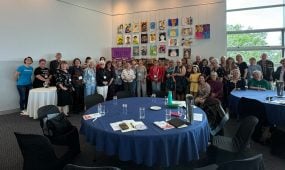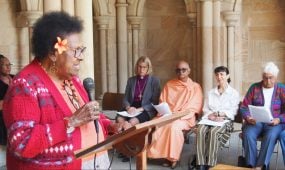A Bible reading tool kit
Reflections
“When I heard the term ‘Bible reading tool kit’, I listened and reflected on the additional tools I can add to my own personal Bible reading tool kit, and it turns out there are a whole raft of ideas we can use to enrich our reading of scripture,” says FormedFaith’s Fiona Hammond

Many people approach Bible reading with daily discipline and passion. Some of us, though, have a rubber band relationship with Bible reading – springing into a New Year’s commitment to daily reading and reflection, only to find that by March we’ve let it stretch away, to bounce back during Lenten discipline! There are plenty of resources available to demystify the texts and inspire understanding. Recently, I heard a term that really appealed to me and gave me a renewed enthusiasm for living daily with the Bible.
Just before physical distancing really kicked in, the FormedFaith team at St Francis College filmed several very talented people talking about the Bible, what it means to them, and key points about how it was produced, and how we can understand it. That’s when The Rev’d Canon Sarah Plowman talked about our ‘Bible reading tool kit’. Sarah meant more than a Lectionary, a study guide and a notebook! When I heard that term ‘Bible reading tool kit’, I listened and reflected on the additional tools I can add to my own personal Bible reading tool kit, and it turns out there are a whole raft of ideas we can use to enrich our reading of scripture.
Awesome tool number one
Approach scripture with an expectation of grace. Many of us have times when we just want to hear what’s right and what’s wrong about the world. There are so many uncertainties in life that it’s tempting to expect faith to iron them out, blanket our insecurities and provide some answers for God’s sake! Ever found that a dogmatic approach to reading the Word is counterproductive? What can happen is that readers look for their own agenda and inevitably find it, but in doing so miss out on other spirit-led ideas.
Advertisement
Approach scripture with an attitude of openness and trust, with an expectation that God will be loving, gracious and good to us, and the scriptures may provide an encounter with grace. The wonderful thing is that no matter what your expertise, this blessing is open to all. When God is at work, people can be touched by it. Approaching the Bible with an expectation of grace means that we don’t have to have a degree in Biblical literacy to be blessed by interaction with scriptures, and that those who do have such qualifications can be surprised by what they find there.
Awesome tool number two
Understand the genre. Genre is something we apply to a Netflix list, or use to identify styles of music on Spotify. Turns out it’s a crucial tool when reading the Bible, too. For starters, it’s a great idea to consider the Bible as a library of books, rather than one big book. The Bible library contains many types of literature: law books, books of prophesy, letters, sermons, apocalyptic literature and so on. Identifying the type of writing is crucial to understanding what’s said in it. As Canon Sarah Plowman suggests in these St Francis College Short Course videos, how frustrating and confusing would it be to open an Aldi catalogue expecting a novel?
Advertisement
Director of Lay Education at St Francis College Jonathan Sargeant takes a look at chapter one of Genesis to illustrate the importance of genre. Here is the first account of creation: Genesis 1.1-31. It has recurring lines like a chorus. It has rhythm. It also has rhyme and when read aloud, it sounds like poetry. Perhaps this was a song used in early worship – we can imagine it sung around a fire, it is a beautiful poem from an ancient people singing of their God who creates and creates well.
Poetry traditionally uses metaphor and imagery (among many other devices) to evoke emotional responses in readers. When we understand that Genesis chapter one is a poem, we also know what it is not. It is not meant to be a manual or textbook with definitive answers about the scientific structure or creation of a biological world. Reading the poem with awed adoration of a great creator allows us to become caught up in the metaphor and symbolism along with those who sang it thousands of years ago. Canon Sarah Plowman suggests that an understanding of genre is an idea that we can all explore every time we approach a new chapter or book.
This new St Francis College Short Course: ‘Exploring the Bible’ is currently presented as a series of short videos, each responding to one burning question about the Bible. There are so many more tools for a Bible reading tool kit! There are ideas about new discoveries, how translations are made, how the Bible is relevant to a modern audience. Each video has a set of reflection questions, and a transcript to check out. It’s a great way to learn more from the comfort of your couch! Let us know which tools you’ll add to your kit! Find the course on the St Francis College website.







